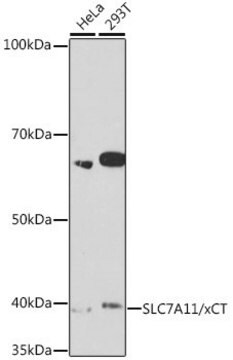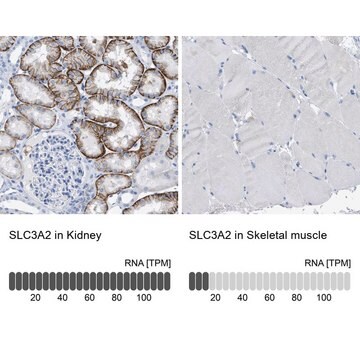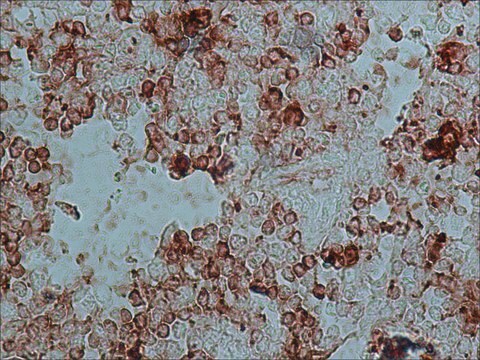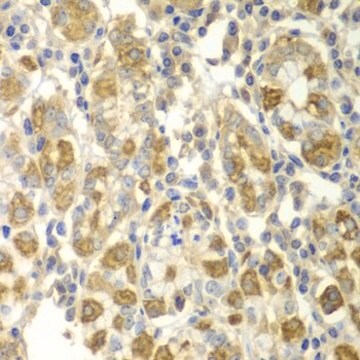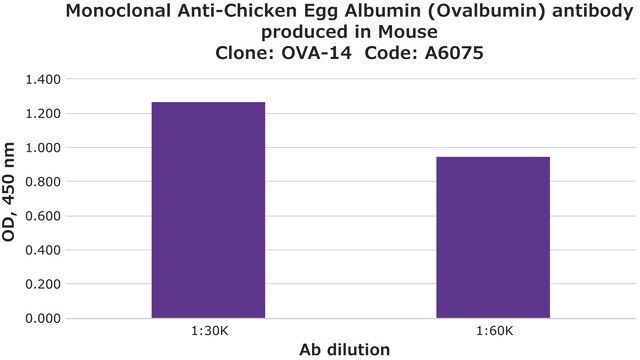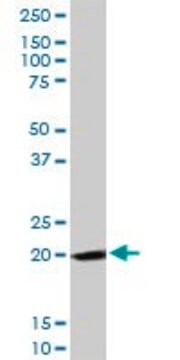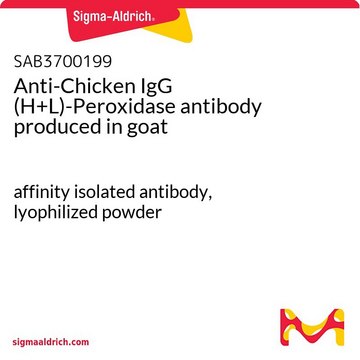SAB1400262
Anti-SLC3A2 antibody produced in rabbit
IgG fraction of antiserum, buffered aqueous solution
Synonym(s):
Anti-4F2, Anti-4F2HC, Anti-4T2HC, Anti-CD98, Anti-CD98HC, Anti-MDU1, Anti-NACAE
About This Item
Recommended Products
biological source
rabbit
Quality Level
conjugate
unconjugated
antibody form
IgG fraction of antiserum
antibody product type
primary antibodies
clone
polyclonal
form
buffered aqueous solution
species reactivity
mouse, human
technique(s)
western blot: 1 μg/mL
UniProt accession no.
shipped in
dry ice
storage temp.
−20°C
target post-translational modification
unmodified
Gene Information
human ... SLC3A2(6520)
General description
Solute carrier family 3 member 2 (SLC3A2) is a type II transmembrane glycoprotein which is widely expressed. It is expressed on the cell membrane and in some types of endosomes. The protein is part of the heterodimeric amino acid transporter family. The SLC3A2 gene is localized on human chromosome 11q13.
Immunogen
Sequence
MSQDTEVDMKEVELNELEPEKQPMNAASGAAMSLAGAEKNGLVKIKVAEDEAEAAAAAKFTGLSKEELLKVAGSPGWVRTRWALLLLFWLGWLGMLAGAVVIIVRAPRCRELPAQKWWHTGALYRIGDLQAFQGHGAGNLAGLKGRLDYLSSLKVKGLVLGPIHKNQKDDVAQTDLLQIDPNFGSKEDFDSLLQSAKKKSIRVILDLTPNYRGENSWFSTQVDTVATKVKDALEFWLQAGVDGFQVRDIENLKDASSFLAEWQNITKGFSEDRLLIAGTNSSDLQQILSLLESNKDLLLTSSYLSDSGSTGEHTKSLVTQYLNATGNRWCSWSLSQARLLTSFLPAQLLRLYQLMLFTLPGTPVFSYGDEIGLDAAALPGQPMEAPVMLWDESSFPDIPGAVSANMTVKGQSEDPGSLLSLFRRLSDQRSKERSLLHGDFHAFSAGPGLFSYIRHWDQNERFLVVLNFGDVGLSAGLQASDLPASASLPAKADLLLSTQPGREEGSPLELERLKLEPHEGLLLRFPYAA
Biochem/physiol Actions
Physical form
Disclaimer
Not finding the right product?
Try our Product Selector Tool.
Storage Class
10 - Combustible liquids
wgk_germany
WGK 1
flash_point_f
Not applicable
flash_point_c
Not applicable
Choose from one of the most recent versions:
Certificates of Analysis (COA)
Don't see the Right Version?
If you require a particular version, you can look up a specific certificate by the Lot or Batch number.
Already Own This Product?
Find documentation for the products that you have recently purchased in the Document Library.
Our team of scientists has experience in all areas of research including Life Science, Material Science, Chemical Synthesis, Chromatography, Analytical and many others.
Contact Technical Service